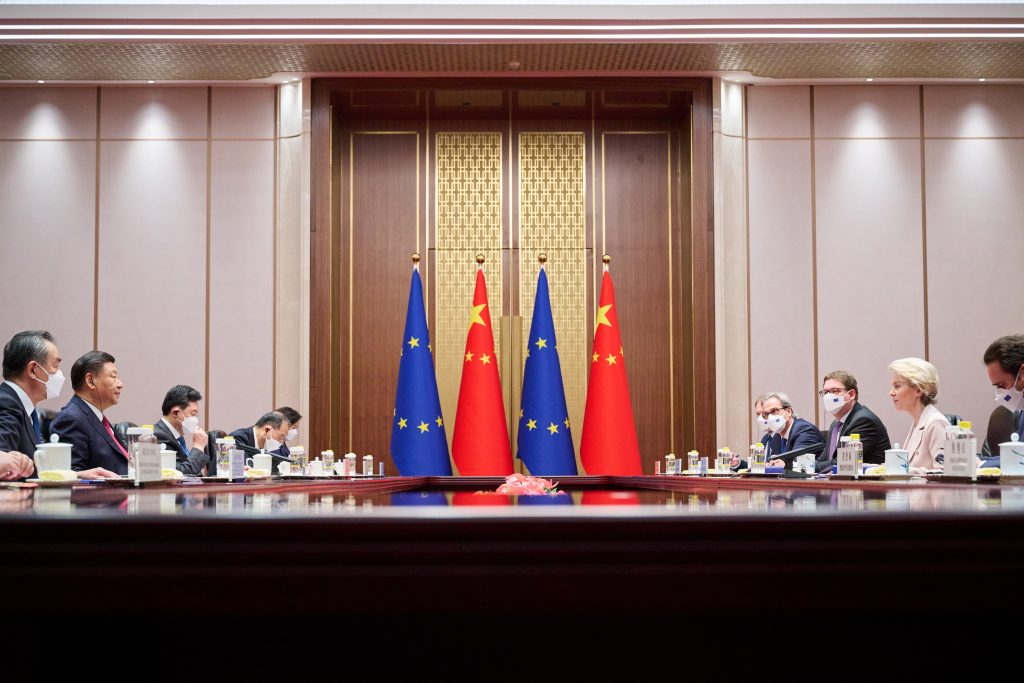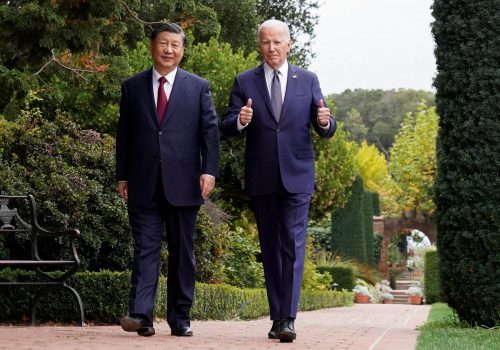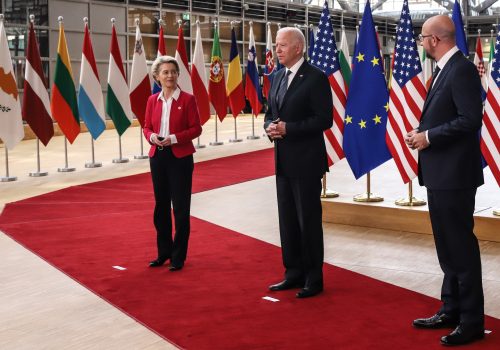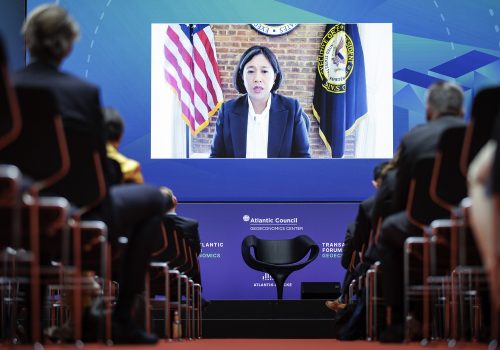This week’s summit between European Union (EU) and Chinese leaders will mark the capstone of a year of intensive in-person engagement between Chinese and European leaders. European Commission President Ursula von der Leyen will travel to Beijing for the second time this year—the only Group of Seven (G7) leader to do so—together with her European Council counterpart Charles Michel for two days of meetings; Chinese Premier Li Qiang is expected to chair the summit for the Chinese side, and the two EU leaders are expected to meet with Chinese leader Xi Jinping, too.
The summit is expected to yield little more than photo ops and a forum for exchanging talking points. If it does prove to be as empty as anticipated, this should spark the EU to rethink its approach to these meetings.
The summit, the first in-person format for this gathering in four years due to the COVID-19 pandemic, comes on the heels of a flurry of meetings and dialogues between European commissioners and their Chinese counterparts aimed at spurring progress on issues such as securing market access for EU companies in China and convincing Beijing to do more to press Russia to halt its war in Ukraine. EU officials came away from those meetings empty-handed, aside from a solid diplomatic win that European Commission Vice President Věra Jourová appears to have chalked up in convincing Beijing to walk back some of its most restrictive policies on foreign companies transferring data out of China.
Beijing, for its part, has likewise complained of unfair trade practices, criticizing the EU’s investigation into subsidies received by Chinese electric vehicle exporters and the EU’s planned Carbon Border Adjustment Mechanism, which began a trial phase in October and could bring substantial new tariffs for Chinese exporters of carbon-intensive products by 2026. These market access issues are likely to be high on the agenda at this week’s summit, where prospects for concrete progress appear equally dim, given entrenched policies on both sides. China’s trade surplus with the EU reached its highest level ever last year at just below 400 billion euros ($434 billion), which has further strained the relationship.
Low expectations
One more tangible outcome the EU might push for is a firm commitment from Xi to curb Chinese entities’ circumvention of sanctions on Russia. The EU has been trying to dial up the public pressure on Beijing recently, with EU sanctions envoy David O’Sullivan stating in September that up to 70 percent of Russia’s sensitive high-tech equipment imports making their way onto the battlefield in Ukraine come via China. However, it will be difficult to garner a commitment from Xi and other Chinese leaders—or hold them accountable to any such deal. Chinese officials made a similar pledge in June that they would do more to curb sanctions evasion after Brussels agreed to drop several Chinese companies from a previous sanctions package, but little appears to have come of that commitment. The EU has initially excluded Chinese firms from its forthcoming twelfth package of sanctions but may add them on unless Chinese leaders credibly pledge at the summit to do more on sanctions evasion.
EU officials have been careful to keep expectations for the summit low, in terms of a joint statement (it’s unlikely there will be one) or announcements on concrete deliverables, with one official suggesting that simply holding the summit is a deliverable. This echoes some of the expectations management in advance of Xi’s meeting last month with US President Joe Biden. But in that case, a meeting in and of itself truly was enough of a deliverable for what was needed at that moment, helping to stabilize the US-China relationship and demonstrate a commitment to maintaining open lines of communication at the highest levels. Ties between Europe and China have never approached the level of distrust and tension that has characterized the US-China relationship (and senior-level diplomatic engagement has never been at serious risk of dropping off), even if tensions are higher than they were a few years ago.
Lowering these expectations probably only serves to reinforce to Beijing the value of keeping EU summits going for propaganda and rhetorical purposes while using engagements with individual countries to push for Beijing’s preferred policies on issues such as access to European markets and technology. This is a well-honed playbook for Beijing; for example, just last month, Xi encouraged German Chancellor Olaf Scholz to push the EU to “uphold the principles of market and fairness, and to work with China to safeguard fair market competition and fair trade”—a reference to the EU’s investigation into Chinese subsidies for electric vehicle producers. Meanwhile, empty summits allow Xi and Chinese leaders to demonstrate that they are responsibly engaging with an important economic partner and major player in what China sees as a “multipolar world,” without having to make any meaningful progress on substance.
Seeking better transatlantic coordination
Better US and European coordination on their China policy could help weaken Beijing’s strategy. Although the two sides are adopting similar terminology vis-à-vis China (both now describing it as a “competitor”) and how they approach their economic and strategic ties to China (with an emphasis on “de-risking” rather than “decoupling”), a transatlantic approach to China has been elusive. At the most recent US-EU Summit last month, for example, the two sides couldn’t overcome differences in their approaches on China policy as well as other issues such as climate and trade.
Focusing on smaller steps where the two sides have common interests vis-à-vis China might be the best way to start. For example, the two sides could increase their information sharing and coordination in confronting the challenge of Chinese economic coercion, particularly as the EU rolls out its new Anti-Coercion Instrument and expects to conclude several assessments of supply-chain vulnerabilities by the end of this year. They could enhance cooperation on building critical mineral supply chains to reduce both sides’ dependence on China, although this issue has been caught up in broader US-EU negotiations about the eligibility of EU vehicles for US Inflation Reduction Act tax credits; hopefully, a recently created task force can help resolve the dispute.
Further afield, the United States and EU could focus on joint investment projects in Global South countries where China has been expanding its footprint. At the latest EU-US Trade and Technology Council (TTC) meeting in May, the United States and EU announced new connectivity and telecommunications projects in Costa Rica and the Philippines, building on joint projects in Kenya and Jamaica that the TTC announced at the end of 2022. The memorandum of understanding signed earlier this year between the US Development Finance Corporation and the European Investment Bank offers an excellent platform for building out such cooperation, as does the Group of Seven’s agreement this year to scale up its signature investment program, the Partnership for Global Infrastructure and Investment.
A return to in-person summits will not be a return to business as usual between the EU and China; no amount of personal engagement between these leaders can paper over growing economic and political strains in the relationship. The question is how much longer EU leaders can afford to have meetings that are heavy on rhetoric but devoid of tangible outcomes as they drive a shift in Europe’s economic security approach to China and face potential retaliation for their approach from Beijing.
Colleen Cottle is the deputy director of the Atlantic Council’s Global China Hub and a former Central Intelligence Agency analyst.
Jörn Fleck is the senior director of the Atlantic Council’s Europe Center.
Further reading
Wed, Nov 15, 2023
Experts react: What did Biden and Xi’s ‘candid’ meeting accomplish?
New Atlanticist By
Atlantic Council experts break down the US and Chinese leaders' four-hour summit and what's coming next.
Wed, Oct 18, 2023
The US-EU Summit: Time to focus on geopolitics
New Atlanticist By
Faced with an increasingly hostile and divided world, US and EU officials must make the most of the upcoming summit in Washington DC.
Fri, Sep 22, 2023
US trade representative backs EU in China anti-subsidy investigation
New Atlanticist By
US Trade Representative Katherine Tai reiterated the importance of managing the US-China relationship at the Transatlantic Forum on GeoEconomics.
Image: On 6 April 2023, Ursula von der Leyen, President of the European Commission, traveled to Beijing, in China, where she participated in trilateral meeting with Xi Jinping, President of the People s Republic of China, and Emmanuel Macron, President of the French Republic - Beijing - Dati Bendo



